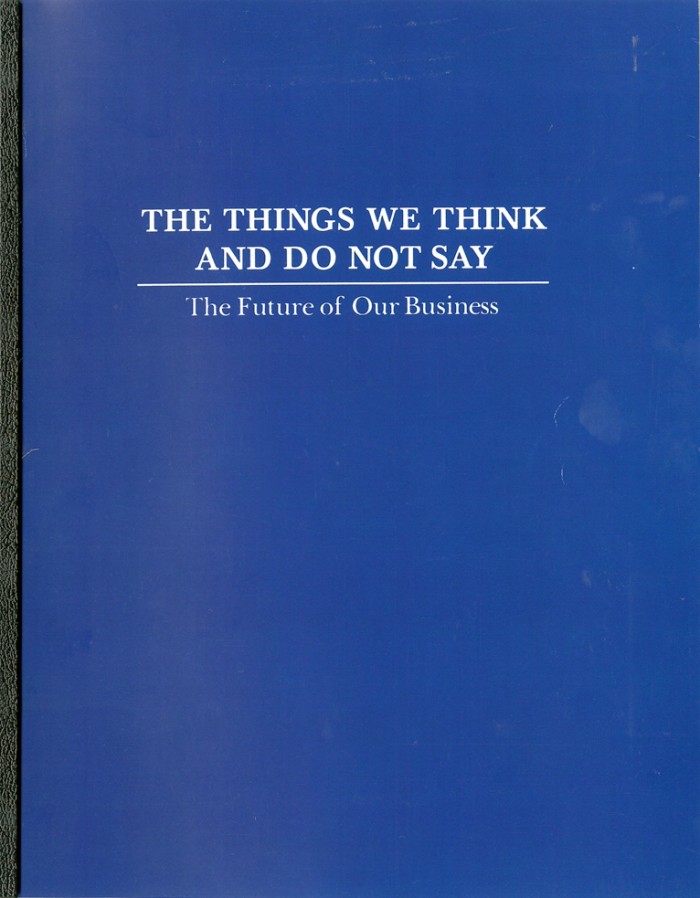Read Cameron Crowe's Entire 25-Page Mission Statement From 'Jerry Maguire'
When Jerry Maguire (Tom Cruise) has a bit of a "breakthrough, not a breakdown," he wears his heart on his sleeve for the first time in a long time and writes "The Things We Think and Do Not Say: The Future of Our Business." What does he get in return for penning the heartfelt mission statement? Fired. Instead of becoming the man he always wanted to be simply overnight, a selfless and caring man, he ends up losing sight of himself once again. While the mission statement initially doesn't go according to plan, Maguire ultimately does become that man he envisioned by the end of writer-director Cameron Crowe's 1996 film.
Via voiceover, we only hear snippets from Maguire's 25-page mission statement, but with the 20th anniversary of Jerry Maguire coming up, "The Things We Think and Do Not Say: The Future of Our Business" has been made available to read in its entirety. Read an excerpt from the Jerry Maguire mission statement below.
The mission statement was reportedly influenced by a memo statement sent out by Jeffrey Katzenberg, in 1991 when he was the head of Disney. Katzenberg wrote an epic 28-page memo, calling for Disney to return to its roots — less reliance on movie stars and spectacle, more focus on storytelling. At the time, he was exasperated with Dick Tracy, a star-filled comic book adaptation that cost around $100 million to make and market. Like Maguire, Katzenberg's memo had its critics and fans.
Thanks to Cameron Crowe's official site, The Uncool, you can now read that 25-page mission statement — or "a love letter to a business I truly love," as Maguire calls it — Crowe wrote for Jerry Maguire.
Here's an excerpt from "The Things We Think and Do Not Say: The Future of Our Business":
We are losing our battle with all that is personal and real about our business. Every day I can look at a list of phone calls only partially returned. Driving home, I think of what was not accomplished, instead of what was accomplished. The gnawing feeling continues. That families are sitting waiting for a call from us, waiting to hear the word on a contract, or a General Manager's thoughts on an upcoming season. We are pushing numbers around, doing our best, but is there any real satisfaction in success without pride? Is there any real satisfaction in a success that exists only when we push the messiness of real human contact from our lives and minds? When we learn not to care enough about the very guy we promised the world to, just to get him to sign. Or to let it bother us that a hockey player's son is worried about his dad getting that fifth concussion.
There is a good bet that I will erase all of this from my laptop, and you will never read it. But if you are reading it, and you're reading it right now, it is only because I was unable to stop. I was unable to forget the quiet questions in the hallways, when some of you, usually the younger agents, or interns, asked me on the side: "How do you keep all these lives, all these clients, separated in your mind?"
Chances are, I didn't say much. I might have told you "it's easy" or "you're not working hard enough." Chances are, I said something that you expected, maybe even wanted to hear. But it wasn't the truth, and it wasn't what I felt. And if you ever wondered about the drawbacks of being quiet about important things, talk to yourself in the mirror some time, say the truth. Yell the truth to yourself, when no one is listening. See how good it feels?
My father worked for the United Way for 38 years. We lived in San Diego for many years, before I left to move up the coast to Los Angeles. One of the things my father said was: "Every time you allow a problem in your life, you are actually at a point of transformation. Crisis is a powerful point of transformation." (Never mind that he sat at the same chair for 38 years, and when he retired said only that he'd wished he'd asked for a more comfortable place to sit.)
We are now at a point of transformation with this company. But this is not something to fear, it is something to celebrate. Because I come to you tonight, looking out at the dark Miami skyline, not only with a challenge. I come to you with answers too.
The mission statement — which is packed with details about Maguire's backstory — ignites the sports agent's journey towards finally taking his former mentor Dickey Fox's advice, that one's job and life is all about "personal relationships," not more money or more clients. So much of "The Things We Think and Do Not Say: The Future of Our Business" reflects what Jerry Maguire is about: what does success mean? According to Cameron Crowe, success doesn't mean nearly as much if you don't have someone to share it with, like a Dorothy Boyd (Renée Zellweger) or a Rod Tidwell (Cuba Good Jr.). Without those connections, Jerry Maguire's life is practically meaningless.

